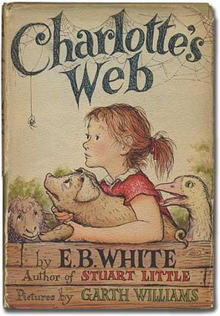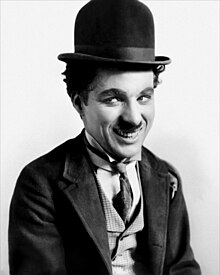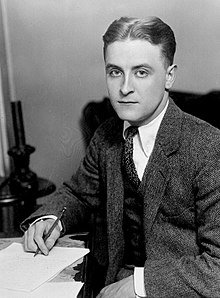Charlotte's Web
Charlotte's Web is a children's novel by American author E. B. White and illustrated by Garth Williams; it was published in October 15, 1952, by Harper & Brothers. The novel tells the story of a pig named Wilbur and his friendship with a barn spider named Charlotte. When Wilbur is in danger of being slaughtered by the farmer, Charlotte writes messages praising Wilbur (such as "Some Pig") in her web in order to persuade the farmer to let him live.
Charlotte's Web was adapted into an animated feature by Hanna-Barbera Productions and Sagittarius Productions in 1973. Paramount released a direct-to-video sequel, Charlotte's Web 2: Wilbur's Great Adventure, in the U.S. in 2003 (Universal released the film internationally). A live-action film version of E. B. White's original story was released in 2006. A video game based on this adaption was also released in 2006.

website: https://www.youtube.com/watch?v=zdX69cWtu6w
E.B. White
Elwyn Brooks "E. B." White (July 11, 1899 – October 1, 1985) was an American writer. He was a contributor to The New Yorker magazine and a co-author of the English language style guide The Elements of Style, which is commonly known as "Strunk & White". He also wrote books for children, including Stuart Little (1945), Charlotte's Web (1952), and The Trumpet of the Swan (1970). Charlotte's Web was voted the top children's novel in a 2012 survey of School Library Journal readers, an accomplishment repeated from earlier surveys.

Stuart Little
Stuart Little is a 1999 American live-action/CGI animated family film directed by Rob Minkoff. It is loosely based on the novel of the same name by E. B. White. It combines live action and computer animation. The screenplay was written by M. Night Shyamalan and Greg Brooker. The plot bears little resemblance to that of the book, as only some of the characters and one or two minor plot elements are the same. The film's sequel more closely resembles the original novel.

website: https://www.youtube.com/watch?v=ZzuuziqAzXk
Tragedy
Tragedy (from the Greek: τραγῳδία, tragōidia) is a form of drama based on human suffering that invokes an accompanying catharsis or pleasure in audiences. While many cultures have developed forms that provoke this paradoxical response, the term tragedy often refers to a specific tradition of drama that has played a unique and important role historically in the self-definition of Western civilisation. That tradition has been multiple and discontinuous, yet the term has often been used to invoke a powerful effect of cultural identity and historical continuity—"the Greeks and the Elizabethans, in one cultural form; Hellenes and Christians, in a common activity," as Raymond Williams puts it.
Comedy
In a modern sense, comedy (from the Greek: κωμῳδία, kōmōidía) refers to any discourse or work generally intended to be humorous or amusing by inducing laughter, especially in theatre, television, film, and stand-up comedy. The origins of the term are found in Ancient Greece. In the Athenian democracy, the public opinion of voters was influenced by the political satire performed by the comic poets at the theaters. The theatrical genre of Greek comedy can be described as a dramatic performance which pits two groups or societies against each other in an amusing agon or conflict. Northrop Frye depicted these two opposing sides as a "Society of Youth" and a "Society of the Old". A revised view characterizes the essential agon of comedy as a struggle between a relatively powerless youth and the societal conventions that pose obstacles to his hopes. In this struggle, the youth is understood to be constrained by his lack of social authority, and is left with little choice but to take recourse in ruses which engender very dramatic irony which provokes laughter.


The Great Gatsby
The Great Gatsby is a 1925 novel written by American author F. Scott Fitzgerald that follows a cast of characters living in the fictional town of West Egg on prosperous Long Island in the summer of 1922. The story primarily concerns the young and mysterious millionaire Jay Gatsby and his quixotic passion and obsession for the beautiful former debutante Daisy Buchanan. Considered to be Fitzgerald's magnum opus, The Great Gatsby explores themes of decadence, idealism, resistance to change, social upheaval, and excess, creating a portrait of the Jazz Age or the Roaring Twenties that has been described as a cautionary tale regarding the American Dream.

F. Scott Fitzgerald
Francis Scott Key Fitzgerald (September 24, 1896 – December 21, 1940), known professionally as F. Scott Fitzgerald, was an American novelist and short story writer, whose works illustrate the Jazz Age. While he achieved limited success in his lifetime, he is now widely regarded as one of the greatest American writers of the 20th century. Fitzgerald is considered a member of the "Lost Generation" of the 1920s. He finished four novels: This Side of Paradise, The Beautiful and Damned, The Great Gatsby, and Tender Is the Night. A fifth, unfinished novel, The Last Tycoon, was published posthumously. Fitzgerald also authored 4 collections of short stories, as well as 164 short stories in magazines during his lifetime.

website: https://www.youtube.com/watch?v=rARN6agiW7o
Poetry
Poetry (the term derives from a variant of the Greek term, poiesis, "making") is a form of literature that uses aesthetic and rhythmic qualities of language—such as phonaesthetics, sound symbolism, and metre—to evoke meanings in addition to, or in place of, the prosaic ostensible meaning.
Love looks not with the eyes, but with the mind.
website: https://www.youtube.com/watch?v=Z2bIWScs1V4
The Shakespeare Theater
The Shakespeare Theater was conceived by Patricio Orozco and for the first time constructed in February 2013, for the III Shakespeare Festival in Buenos Aires opening.
The Shakespeare Theater is a mobile construction that evokes an Elizabethan theatre and has as its main objective to bring the spectator to a new theater experience. The Theater invites spectators to take part on the plays the same way they did in London in the 1600, at the theater where Shakespeare exposed his texts.
Globe Theatre
The Globe Theatre was a theatre in London associated with William Shakespeare. It was built in 1599 by Shakespeare's playing company, the Lord Chamberlain's Men, on land owned by Thomas Brend and inherited by his son, Nicholas Brend and grandson Sir Matthew Brend, and was destroyed by fire on 29 June 1613. A second Globe Theatre was built on the same site by June 1614 and closed by an Ordinance issued on 6 September 1642.
Critical approaches to Hamlet
From its premiere at the turn of the 17th century, Hamlet has remained Shakespeare's best-known, most-imitated, and most-analyzed play. The character of Hamlet played a critical role in Sigmund Freud's explanation of the Oedipus complex and thus influenced modern psychology. Even within the narrower field of literature, the play's influence has been strong. As Foakes writes, "No other character's name in Shakespeare's plays, and few in literature, have come to embody an attitude to life [...] and been converted into a noun in this way."


沒有留言:
張貼留言